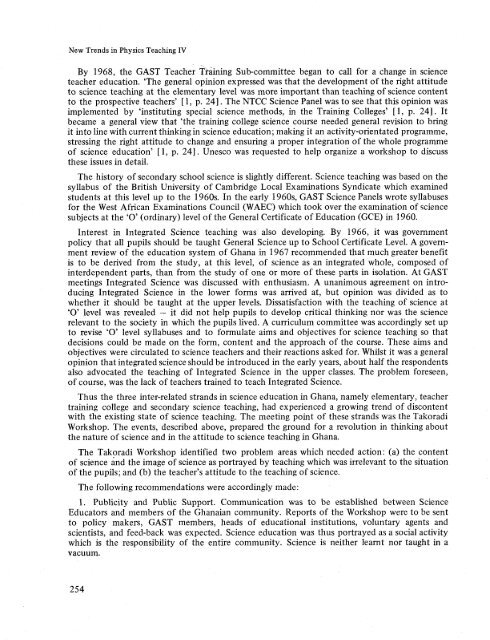New trends in physics teaching, v.4; The ... - unesdoc - Unesco
New trends in physics teaching, v.4; The ... - unesdoc - Unesco
New trends in physics teaching, v.4; The ... - unesdoc - Unesco
You also want an ePaper? Increase the reach of your titles
YUMPU automatically turns print PDFs into web optimized ePapers that Google loves.
<strong>New</strong> Trends <strong>in</strong> Physics Teach<strong>in</strong>g IV<br />
By 1968, the GAST Teacher Th<strong>in</strong><strong>in</strong>g Sub-committee began to call for a change <strong>in</strong> science<br />
teacher education. ‘<strong>The</strong> general op<strong>in</strong>ion expressed was that the development of the right attitude<br />
to science teach<strong>in</strong>g at the elementary level was more important than teach<strong>in</strong>g of science content<br />
to the prospective teachers’ [ 1, p. 241. <strong>The</strong> NTCC Science Panel was to see that this op<strong>in</strong>ion was<br />
implemented by ‘<strong>in</strong>stitut<strong>in</strong>g special science methods, <strong>in</strong> the Tra<strong>in</strong><strong>in</strong>g Colleges’ [ 1, p. 241. It<br />
became a general view that ‘the tra<strong>in</strong><strong>in</strong>g college science course needed general revision to br<strong>in</strong>g<br />
it <strong>in</strong>to l<strong>in</strong>e with current th<strong>in</strong>k<strong>in</strong>g <strong>in</strong> science education; mak<strong>in</strong>g it an activity-orientated programme,<br />
stress<strong>in</strong>g the right attitude to change and ensur<strong>in</strong>g a proper <strong>in</strong>tegration of the whole programme<br />
of science education’ [ 1, p. 241. <strong>Unesco</strong> was requested to help organize a workshop to discuss<br />
these issues <strong>in</strong> detail.<br />
<strong>The</strong> history of secondary school science is slightly different. Science teach<strong>in</strong>g was based on the<br />
syllabus of the British University of Cambridge Local Exam<strong>in</strong>ations Syndicate which exam<strong>in</strong>ed<br />
students at this level up to the 1960s. In the early 1960s, GAST Science Panels wrote syllabuses<br />
for the West African Exam<strong>in</strong>ations Council (WAEC) which took over the exam<strong>in</strong>ation of cience<br />
subjects at the ‘0’(ord<strong>in</strong>ary) level of the General Certificate of Education (GCE) <strong>in</strong> 1960.<br />
Interest <strong>in</strong> Integrated Science teach<strong>in</strong>g was also develop<strong>in</strong>g. By 1966, it was government<br />
policy that all pupils should be taught General Science up to School Certificate Level. A government<br />
review of the education system of Ghana <strong>in</strong> 1967 recommended that much greater benefit<br />
is to be derived from the study, at this level, of science as an <strong>in</strong>tegrated whole, composed of<br />
<strong>in</strong>terdependent parts, than from the study of one or more of these parts <strong>in</strong> isolation. At GAST<br />
meet<strong>in</strong>gs Integrated Science was discussed with enthusiasm. A unanimous agreement on <strong>in</strong>troduc<strong>in</strong>g<br />
Integrated Science <strong>in</strong> the lower forms was arrived at, but op<strong>in</strong>ion was divided as to<br />
whether it should be taught at the upper levels. Dissatisfaction with the teach<strong>in</strong>g of science at<br />
‘0’ level was revealed - it did not help pupils to develop critical th<strong>in</strong>k<strong>in</strong>g nor was the science<br />
relevant to the society <strong>in</strong> which the pupils lived. A curriculum committee was accord<strong>in</strong>gly set up<br />
to revise ‘0’ level syllabuses and to formulate aims and objectives for science teach<strong>in</strong>g so that<br />
decisions could be made on the form, content and the approach of the course. <strong>The</strong>se aims and<br />
objectives were circulated to science teachers and their reactions asked for. Whilst it was a general<br />
op<strong>in</strong>ion that <strong>in</strong>tegrated science should be <strong>in</strong>troduced <strong>in</strong> the early years, about half the respondents<br />
also advocated the teach<strong>in</strong>g of Integrated Science <strong>in</strong> the upper classes. <strong>The</strong> problem foreseen,<br />
of course, was the lack of teachers tra<strong>in</strong>ed to teach Integrated Science.<br />
Thus the three <strong>in</strong>ter-related strands <strong>in</strong> science education <strong>in</strong> Ghana, namely elementary, teacher<br />
tra<strong>in</strong><strong>in</strong>g college and secondary science teach<strong>in</strong>g, had experienced a grow<strong>in</strong>g trend of discontent<br />
with the exist<strong>in</strong>g state of science teach<strong>in</strong>g. <strong>The</strong> meet<strong>in</strong>g po<strong>in</strong>t of these strands was the Takoradi<br />
Workshop. <strong>The</strong> events, described above, prepared the ground for a revolution <strong>in</strong> th<strong>in</strong>k<strong>in</strong>g about<br />
the nature of science and <strong>in</strong> the attitude to science teach<strong>in</strong>g <strong>in</strong> Ghana.<br />
<strong>The</strong> Takoradi Workshop identified two problem areas which needed action: (a) the content<br />
of science and the image of science as portrayed by teach<strong>in</strong>g which was irrelevant to the situation<br />
of the pupils; and (b) the teacher’s attitude to the teach<strong>in</strong>g of science.<br />
<strong>The</strong> follow<strong>in</strong>g recommendations were accord<strong>in</strong>gly made:<br />
1. Publicity and Public Support. Communication was to be established between Science<br />
Educators and members of the Ghanaian community. Reports of the Workshop were to be sent<br />
to policy makers, GAST members, heads of educational <strong>in</strong>stitutions, voluntary agents and<br />
scientists, and feed-back was expected. Science education was thus portrayed as a social activity<br />
which is the responsibility of the entire community. Science is neither learnt nor taught <strong>in</strong> a<br />
vacuum.<br />
254
















